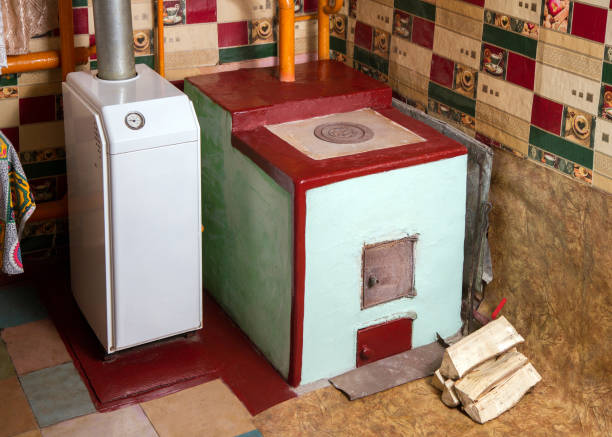If you have an old back boiler in your home, it might be time to consider replacing it. Back boilers were popular in the past, but modern heating systems are much more efficient and reliable.
For this reason, the UK government is helping those homeowners or tenants who are claiming benefits. They can get the free boiler replacement grant under the ECO4 scheme & BUS if they are eligible. There are various options available under the grant to replace your back boiler. This guide will help you understand your options when replacing an old back boiler.
What Is a old Back Boiler?
A back boiler is a heating system that’s installed behind a fireplace or stove. It heats water for your home’s heating system and provides hot water for taps. While back boilers were once common, they are now considered outdated because they are less efficient than modern boilers.
Why Replace Your Back Boiler?
There are several reasons to replace your old back boiler:
- Energy Efficiency: Modern boilers are much more energy-efficient, meaning they use less fuel to produce the same amount of heat. This can save you money on your energy bills.
- Safety: Old back boilers can be unsafe if they are not maintained properly. Replacing them can reduce the risk of leaks and other hazards.
- Space: Back boilers take up a lot of space. Modern boilers are more compact and can free up room in your home.
- Reliability: New boilers are more reliable and less likely to break down, ensuring you have consistent heating and hot water.
Option 1: Combi Boilers
Combi boilers, or combination boilers, are a popular choice for replacing back boilers. Here’s why:
- Efficiency: Combi boilers are highly efficient, providing hot water on demand without needing a separate water tank.
- Space-Saving: They are compact and can be installed in a variety of locations, freeing up space in your home.
- Cost-Effective: Because they are efficient, combi boilers can reduce your energy bills over time.
Things to Consider: Combi boilers might not be the best option for large homes with multiple bathrooms, as they can struggle to supply hot water to several taps at once.
Option 2: System Boilers
System boilers are another good option. They use a separate hot water cylinder but don’t need a cold water tank. Here’s why they’re a great choice:
- Efficiency: System boilers are efficient and can provide hot water to multiple taps at the same time.
- Storage: They are ideal for homes with higher hot water demands.
- Space: Although they require a hot water cylinder, they still take up less space than traditional back boilers.
Things to Consider: Installation might be more complicated than combi boilers, and you will need space for the hot water cylinder.
Option 3: Regular Boilers
Regular boilers, also known as traditional or conventional boilers, are similar to back boilers but more efficient. They require both a hot water cylinder and a cold water tank. Here’s why you might choose a regular boiler:
- High Demand: They can handle high hot water demands, making them suitable for large homes.
- Compatibility: They are compatible with older heating systems, which can make installation easier in some cases.
Things to Consider: Regular boilers take up more space due to the need for a hot water cylinder and a cold water tank. They might not be the best option if you want to save space.
Option 4: Heat Pumps
Heat pumps are an energy-saving alternative to boilers. Air source heat pumps use energy from outside air to heat your home. Here’s why heat pumps are worth considering:
- Eco-Friendly: Heat pumps are much better for the environment as they use renewable energy sources.
- Efficiency: They are highly efficient, especially in well-insulated homes.
- Savings: While the initial cost is high, you can save money on energy bills over time.
Things to Consider: Heat pumps have higher upfront costs and might require significant changes to your home’s heating system.
Option 5: Electric Boilers
Electric boilers are another option, especially if your home doesn’t have a gas supply. Here’s why they might be a good fit:
- Simple Installation: Electric boilers are easy to install and don’t require a flue or gas supply.
- Compact: They are compact and can fit in small spaces.
- Low Maintenance: Electric boilers have fewer moving parts, meaning less maintenance is needed.
Things to Consider: Electric boilers can be more expensive to run than gas boilers, depending on electricity prices.
Getting Government Help
Replacing a back boiler can be expensive, but there are grants and schemes available to help:
- ECO4 Scheme: This government scheme provides funding to help improve energy efficiency in homes. You might be eligible for a grant to replace your old boiler.
- Boiler Upgrade Scheme (BUS): This scheme offers grants to help cover the cost of installing low-carbon heating systems like heat pumps.
Conclusion
Replacing your old back boiler with a modern heating system can improve your home’s efficiency, safety, and comfort. Whether you choose a combi boiler, system boiler, regular boiler, heat pump, or electric boiler, there are plenty of options to suit your needs and budget. Don’t forget to explore financial help available through government schemes to make the switch more affordable. A new boiler will not only keep your home warm but also save you money in the long run.
